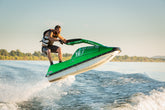In many regions, having a valid boating license is a legal requirement for operating a boat or other watercraft. This license demonstrates that you have the necessary knowledge and skills to navigate safely on the water, ensuring the protection of both yourself and others. By obtaining a boating license, you can enjoy the freedom and thrill of being on the water while adhering to local regulations and promoting responsible boating practices.
Boating licenses are often required for a variety of watercraft, including:
- Motorized boats (e.g., speedboats, pontoon boats, jet skis)
- Sailboats over a certain length or with an engine
- Personal watercraft (PWCs) like Jet Skis or WaveRunners
The specific requirements for obtaining a boating license may vary depending on your location, the type of watercraft you intend to operate, and your age. It's important to research the regulations in your area to ensure you meet all the necessary criteria.
Different types of boating licenses
Boating licenses come in various forms, each tailored to the specific needs and requirements of different boaters. Here are some of the most common types of boating licenses:
-
Recreational Boating License: This is the most common type of boating license, designed for individuals who operate recreational watercraft for personal use. The requirements and exam content typically cover topics such as navigation, safety, and boating regulations.
-
Commercial Boating License: If you plan to operate a boat or watercraft for commercial purposes, such as carrying passengers or transporting goods, you may need a commercial boating license. These licenses often have more stringent requirements and cover additional topics related to commercial operations.
-
Specialty Licenses: Some regions may offer specialized boating licenses for operating specific types of watercraft, such as jet skis, personal watercraft, or large yachts. These licenses may have additional training or experience requirements.
-
International Boating Licenses: If you plan to operate a boat in multiple countries or regions, you may need an international boating license that is recognized across borders. These licenses often require passing a standardized exam and meeting specific criteria.
It's important to research the specific license requirements for your intended boating activities and location to ensure you obtain the appropriate license.
Requirements for getting a boating license
The requirements for obtaining a boating license can vary significantly depending on your location and the type of license you are seeking. However, there are some common elements that are often required:
-
Age Requirement: Many regions have minimum age requirements for obtaining a boating license, typically ranging from 12 to 18 years old.
-
Boating Safety Course: Completing a boating safety course is a common prerequisite for obtaining a boating license. These courses cover topics such as navigation, boat handling, emergency procedures, and local boating regulations.
-
Written Exam: Passing a written exam that tests your knowledge of boating safety, navigation, and regulations is typically required. The exam may cover both theoretical and practical aspects of boating.
-
On-Water Exam: In some cases, you may need to demonstrate your practical skills by passing an on-water exam, where you will be evaluated on your ability to safely operate a boat.
-
Identification and Documentation: You may be required to provide valid identification, such as a driver's license, and potentially other documentation, like proof of residency or previous boating experience.
-
Fees: There are often fees associated with obtaining a boating license, which can vary depending on the region and the type of license you are seeking.
It's essential to research the specific requirements in your area and ensure you meet all the necessary criteria before applying for a boating license.
How to study for the boating license exam
Preparing for the boating license exam is crucial to ensure you have the knowledge and skills required to operate a boat safely. Here are some tips to help you study effectively:
-
Enroll in a Boating Safety Course: Participating in an approved boating safety course is one of the best ways to prepare for the exam. These courses cover all the essential topics and provide hands-on training to help you develop the necessary skills.
-
Review the Exam Study Guide: Most boating license authorities provide study guides or manuals that outline the topics covered in the exam. Thoroughly review this material to familiarize yourself with the content.
-
Practice with Online Resources: Many organizations offer online practice exams, interactive quizzes, and other digital resources to help you prepare for the boating license exam. Take advantage of these tools to test your knowledge and identify areas that need more attention.
-
Attend Boating Safety Seminars: Look for local boating safety seminars or workshops that provide additional training and information to help you prepare for the exam.
-
Gain Practical Experience: If possible, try to get some hands-on experience operating a boat under the guidance of an experienced boater. This can help you better understand the practical aspects of safe boating.
-
Create a Study Schedule: Develop a structured study plan that allows you to review the material consistently and thoroughly. Set aside dedicated time for studying and stick to your schedule.
By following these steps, you can increase your chances of passing the boating license exam with confidence and become a safe and responsible boater.
Taking the boating license exam
The boating license exam is a crucial step in the process of obtaining your boating license. Here's what you can expect during the exam:
-
Exam Format: The exam typically consists of a written test that covers a range of topics, including navigation, boat handling, safety, and local regulations. The format may include multiple-choice, true/false, or fill-in-the-blank questions.
-
Exam Duration: The length of the exam can vary, but it is often around 1-2 hours, depending on the number of questions and the complexity of the material.
-
Passing Score: The minimum passing score for the boating license exam can range from 70% to 80%, depending on the jurisdiction. It's important to familiarize yourself with the passing requirements in your area.
-
Exam Locations: Boating license exams are typically administered at approved testing centers, such as boating schools, marinas, or government agencies. You may need to schedule an appointment in advance to take the exam.
-
Exam Materials: During the exam, you may be allowed to use certain materials, such as navigation charts or reference books. However, it's important to check with the exam administrator about any permitted resources.
-
Exam Retakes: If you do not pass the exam on your first attempt, you may be able to retake it, often after a waiting period or by paying an additional fee. The number of retakes allowed may also vary.
Remember, it's crucial to prepare thoroughly for the boating license exam to ensure you have the knowledge and skills necessary to operate a boat safely. By passing the exam, you'll be one step closer to enjoying the freedom and excitement of boating.
What to expect during the boating license exam
The boating license exam is designed to assess your understanding of safe boating practices, navigation, and local regulations. Here's a closer look at what you can expect during the exam:
-
Navigation and Boat Handling: The exam will likely include questions about reading navigation charts, understanding buoys and markers, and properly maneuvering a boat in various situations.
-
Safety and Emergency Procedures: You'll be tested on your knowledge of safety equipment, emergency preparedness, and how to respond to various boating-related emergencies.
-
Boating Regulations: The exam will cover your understanding of local and federal boating laws, such as speed limits, right-of-way rules, and requirements for registering and operating a boat.
-
Environmental Considerations: Some exams may include questions about protecting the marine environment, such as proper waste disposal and minimizing the impact of boating activities.
-
Practical Scenarios: You may be presented with hypothetical situations and asked to demonstrate your decision-making skills and ability to apply safe boating practices.
-
Exam Structure: The exam may consist of multiple-choice, true/false, or fill-in-the-blank questions. Some exams may also include a practical, on-water component to assess your boat handling skills.
During the exam, it's important to remain calm, carefully read the questions, and apply the knowledge you've gained through your studies and any hands-on boating experience. Remember, the goal of the exam is to ensure you have the necessary skills and knowledge to be a safe and responsible boater.
How long does it take to get a boating license?
The time it takes to obtain a boating license can vary depending on several factors, including:
-
Boating Safety Course: Completing an approved boating safety course is often a prerequisite for obtaining a boating license. The duration of these courses can range from a few hours to several days, depending on the specific program.
-
Exam Scheduling: After completing the boating safety course, you'll need to schedule and take the boating license exam. The availability and scheduling of the exam can impact the overall timeline.
-
Exam Preparation: The time it takes to prepare for the boating license exam can vary significantly based on your prior experience, the complexity of the material, and the amount of time you dedicate to studying.
-
Exam Retakes: If you don't pass the exam on your first attempt, you may need to wait a certain period before retaking it, which can add to the overall time it takes to obtain your license.
-
Administrative Processes: Depending on your location, there may be additional administrative steps, such as submitting paperwork or paying fees, that can influence the timeline.
In general, the entire process of obtaining a boating license, from completing the boating safety course to passing the exam, can take anywhere from a few weeks to several months, depending on the specific requirements and your personal circumstances.
It's important to plan ahead and allow sufficient time to complete all the necessary steps to ensure you obtain your boating license in a timely manner.
Renewing and maintaining your boating license
Maintaining your boating license is crucial to ensure you can continue operating a boat or watercraft legally and safely. Here's what you need to know about renewing and maintaining your boating license:
-
Renewal Period: Boating licenses typically need to be renewed on a regular basis, often every 1-5 years, depending on the jurisdiction. It's important to be aware of the expiration date of your license and plan for the renewal process in advance.
-
Renewal Requirements: The requirements for renewing a boating license may include:
- Completing a boating safety refresher course
- Passing a written exam (or a portion of the exam)
- Providing updated personal or identification information
- Paying the applicable renewal fees
-
Maintaining Boating Knowledge: Even if your license doesn't require periodic renewal, it's essential to stay up-to-date with changes in boating regulations, safety practices, and navigation techniques. Regularly reviewing boating safety materials and participating in continuing education courses can help you maintain your knowledge and skills.
-
Reporting Changes: If you experience any changes that may affect your boating license, such as a change of address or a medical condition that could impact your ability to operate a boat safely, you should report these changes to the appropriate authorities.
-
Consequences of Expired or Revoked Licenses: Operating a boat with an expired or revoked license can result in significant penalties, including fines, suspension of boating privileges, or even criminal charges. It's crucial to ensure your boating license remains valid and up-to-date.
By staying informed about the renewal and maintenance requirements for your boating license, you can continue to enjoy the freedom and excitement of boating while prioritizing safety and compliance with local regulations.
Boating safety tips for license holders
As a licensed boater, it's essential to maintain a strong commitment to safety on the water. Here are some key boating safety tips to keep in mind:
-
Wear a Life Jacket: Ensure that you and all your passengers wear properly fitted life jackets at all times while on the water.
-
Understand Weather and Water Conditions: Check weather forecasts and be aware of changing water conditions before and during your boating trip.
-
Maintain Your Boat: Regularly inspect and maintain your boat to ensure it is in good working condition and seaworthy.
-
Familiarize Yourself with Navigation: Become proficient in reading navigation charts, understanding buoys and markers, and using navigation equipment.
-
Communicate and File a Float Plan: Let someone on land know your planned route and expected return time, and keep them informed of any changes.
-
Avoid Alcohol and Drugs: Never operate a boat under the influence of alcohol or drugs, as it significantly impairs your judgment and reaction time.
-
Respect Other Boaters: Adhere to right-of-way rules and be courteous to other boaters to promote a safe and enjoyable experience for everyone on the water.
-
Stay Informed: Regularly review boating safety materials and attend refresher courses to keep your knowledge and skills up-to-date.
By following these safety tips and continuously prioritizing safe boating practices, you can help ensure your boating experiences are both enjoyable and responsible.
Conclusion
Obtaining a boating license is a crucial step in becoming a safe and responsible boater. By understanding the different types of boating licenses, meeting the necessary requirements, and thoroughly preparing for the exam, you can ensure you have the knowledge and skills to navigate the waters safely.
Remember, the boating license exam is designed to assess your understanding of navigation, safety, and local regulations, so it's important to take the time to study and practice. With dedication and commitment, you can successfully obtain your boating license and enjoy the freedom and excitement of being on the water.


![Veratron OL 43 Smart Marine Monitoring TFT Display [B00126101]](http://arcmarine.co/cdn/shop/files/111172XL_165x.jpg?v=1763678982)
![Veratron Suzuki VMH-35 PWM Display w/Sumitomo Connectors [B00204101]](http://arcmarine.co/cdn/shop/files/111170XL_165x.jpg?v=1763678982)



